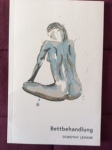
Jean-Martin Charcot was a neurologist, a physician who specialized in diseases of the nervous system. He was a professor of pathological anatomy at the Sorbonne and physician in charge of the care of patients at the Salpêtrière. When he died in 1893 an obituary was written by his pupil Sigmund Freud and one of the paragraphs is of particular note:
‘But to his pupils, who made the rounds with him through the wards of the Salpêtrière – the museum of clinical facts for the greater part named and defined by him – he seemed a very Cuvier, as we see him in the statue in front of the Jardin des Plantes, surrounded by the various types of animal life which he had understood and described; or else he had reminded them of the myth of Adam, who must have experienced in its most perfect form that intellectual delight so highly praised by Charcot, when the Lord led before him the creatures of Paradise to be named and grouped.’
As Thomas Szasz puts it in his monumental book from 1960, The Myth of Mental Illness / Foundations of a Theory of Personal Conduct:
‘To Charcot and Freud, these patients are mere objects or things to be classified and manipulated. It is an utterly dehumanized view of the sick person. But then, we might recall that even today physicians often speak of “cases” and “clinical material” rather than of persons, thus betraying the same bias.’
In Dorothy Lehane’s powerful prose pieces published last year by Muscaliet Press Charcot is ‘show-man’ and the portrait of women we see are ‘performative’. Throughout this relentlessly poignant account of medical imprisonment (definition of what constitutes need for the hysterical female subjects is provided by those in charge) we hear pleading voices of the incarcerated who are ‘always drawing an assembly to convince’, voices of those who are aware of the centrality of performance since, after all, ‘the performative “I do” is a means to the end of marriage’. Performance in a public sphere is closely bound up in Lehane’s terms with the public expectations of sexuality; ‘high & holy is performative’ where the first word hints of suicide and the ‘leap out of a window’ whereas the second confronts the reader with ‘the human face is a multiple sexual organ’.
Time and again during my reading of this unforgettable wring of anguish I am reminded of the final chapter in R.D. Laing’s The Divided Self, published one year before Thomas Szasz. In ‘The ghost of the weed garden (a study of a chronic schizophrenic)’ Julie is perceived by her mother as going through three stages changing from ‘a good, normal, healthy child’ to being ‘bad…caused great distress’ before finally all parental responsibility could be peacefully resolved by the judgement that Julie had gone ‘beyond all tolerable limits so that she could only be regarded as completely mad’. The existential deadness of being socially/domestically good had been followed by Julie’s desperate attempt at self-expression (bad) before retreating into the defined world of madness where her words perhaps said more than anything else to express that isolation of entombment:
She was born under a black sun.
She’s the occidental sun.
I’m the prairie.
She’s a ruined city.
She’s the ghost of the weed garden.
Or, as she concluded, ‘She’s just one of those girls who live in the world. Everyone pretends to want her and doesn’t want her. I’m just leading the life now of a cheap tart’.
Dorothy Lehane’s new book is intense and complex and I have merely scratched something on the surface here. I recall a review I wrote five years ago when Lehane’s magazine Litmus came out. In her editorial introduction to issue 2 she said that within the journal we will find ‘a scientific undertow; the poetry is inherently neurological and yet doesn’t labour to assign literary parallels for scientific theory, nor promote heavy use of devices such as metaphor, but presents subtle coded work operating at the limits of collaborative engagement’. I urge readers here to engage with this intensely demanding new network of language and recognise how deeply we are all involved in the definitions which enclose us:
‘mama’s swan song was believing that the sing-
song is just a game’
Also, I urge you to recall the fist within the glove of language and never forget Toni Morrison’s assertion in Beloved that definitions belong to the definer not to the defined.
Ian Brinton, 25th March 2019
